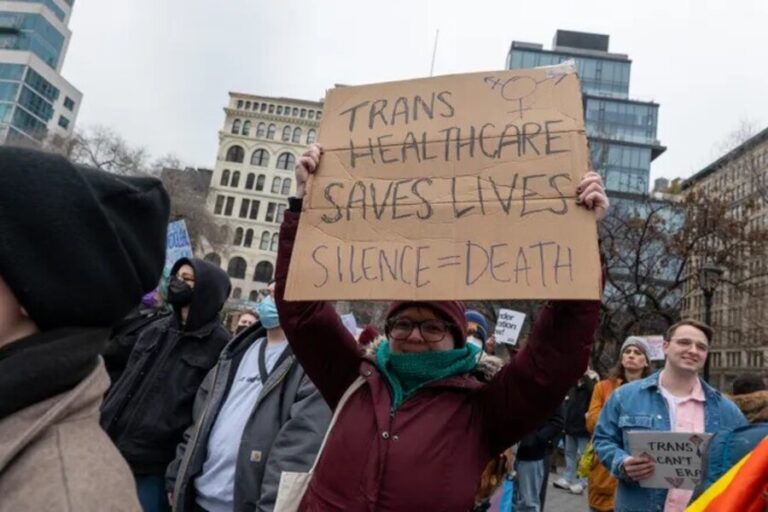A bipartisan crisis hotline that has supported millions of Americans in mental distress may soon lose a vital component that serves LGBTQ+ youth, and more than 100 Congressional Democrats are urging the Biden administration to reconsider.
In a letter addressed to Uthe .S. Health and Human Services (HHS) Secretary Robert F. Kennedy Jr., 109 House Democrats have called on the agency to reverse proposed budget cuts that would dismantle LGBTQ+-specific support services under the 988 Suicide & Crisis Lifeline. The lawmakers argue that the planned changes would jeopardize the mental health and safety of a disproportionately vulnerable population.
What Is Being Cut and Why It Matters
The 988 Suicide & Crisis Lifeline was launched nationally in July 2022, offering 24/7 access to mental health crisis counselors via phone, text, or online chat. Designed as a mental health parallel to 911, the Lifeline provides specialized support not just for the general public, but also for veterans, non-English speakers, and LGBTQ+ youth. The service was established through the National Suicide Hotline Designation Act of 2020, signed into law by former President Donald Trump.
Among its most critical offerings is a dedicated LGBTQ+ youth hotline, operated in partnership with The Trevor Project and other mental health nonprofits. Of the more than 13 million contacts the Lifeline has handled to date, approximately 1.2 million were routed through this LGBTQ+ support channel. According to The Trevor Project, the volume of those calls has increased sharply in recent months — a reflection of growing mental health struggles among LGBTQ+ youth.
But that lifeline is now under threat. The HHS proposal, first reported by The Washington Post, would eliminate the LGBTQ+ youth-specific services as part of a broader agency restructuring. The overhaul aims to streamline HHS from 28 divisions into 15, under a newly formed entity called the Administration for a Healthy America, meant to spearhead Secretary Kennedy’s “Make America Healthy Again” agenda.
If approved, the cuts would take effect October 1, pending final Congressional review.
A Plea from Lawmakers: ‘This Plan Will Have Lethal Consequences’
In their joint letter, House Democrats warned that eliminating LGBTQ+ youth support under 988 would “devastate a vital resource for some of our nation’s most vulnerable young people.” Signatories include Reps. Rashida Tlaib (D-MI), Mark Pocan (D-WI), Seth Moulton (D-MA), and Raja Krishnamoorthi (D-IL).
“Mental health crises do not recognize partisan differences, and this is why support for 988 and its specialized services has always been firmly bipartisan,” the letter reads. “We urge that you scrap this ill-advised plan. Our nation’s children deserve nothing less.”
A similar letter was sent earlier this month by Senate Democrats, including Sens.. Elizabeth Warren, Tammy Baldwin, Jeff Merkley, and Ed Markey.
Why the LGBTQ+ Community Is Especially at Risk
Mental health statistics underscore the high stakes. According to The Trevor Project:
- Suicide is the second leading cause of death among youth aged 10 to 14.
- It is the third leading cause among those aged 15 to 24.
- LGBTQ+ youth are more than four times as likely to attempt suicide as their non-LGBTQ+ peers.
- Over 1.8 million LGBTQ+ youth seriously consider suicide each year in the U.S.
- In 2024, 40% of LGBTQ+ youth reported seriously considering suicide, with 12% attempting it.
“Suicide prevention is about risk, not identity,” said Jaymes Black, CEO of The Trevor Project. “Ending LGBTQ+ specialized services through 988 will not just strip away access. It will put lives at risk.”
Experts and Advocates Sound the Alarm
Mental health professionals and LGBTQ+ advocates have echoed the lawmakers’ concerns, warning that removing LGBTQ+ tailored services from the 988 lifeline could place additional pressure on an already strained behavioral health system.
Dr. Tom Milam, chief medical officer of Iris Telehealth, noted that with limited access to outpatient therapy, many patients already resort to emergency rooms for mental health care — the most expensive and least specialized option. “988 has been a game-changer,” he said. “Without it, more people will call 911 or head to ERs, which are ill-equipped for these crises.”
Rachael Fried, executive director of Jewish Queer Youth (JQY), warned that the proposed cuts would further erode hope among LGBTQ+ youth: “The administration’s proposal… will have devastating and deadly consequences.”
HHS Responds: Services Still Intact for Now
In response to the letter, a spokesperson from HHS’s Substance Abuse and Mental Health Services Administration (SAMHSA) emphasized that no changes have yet been implemented.
“All 988 services currently remain available and unaltered,” the spokesperson said. “988 offers 24/7 call, text, and chat access to skilled, caring crisis counselors who support anyone in distress — including those concerned about loved ones.”
Still, advocates say the potential rollback represents a significant threat to national suicide prevention infrastructure and the well-being of LGBTQ+ youth.
What’s Next?
While the restructuring plan remains in draft form, its final adoption would require Congressional approval. Lawmakers and advocates alike are expected to continue pushing back, arguing that the stakes are too high to allow any lapse in support.
“There is no debate that every young life is worth saving,” said The Trevor Project’s Black. “We urge Congress to protect this bipartisan, data-backed program and ensure its services remain available to all who need them, especially the LGBTQ+ youth who rely on it most.”
Key Takeaways for Readers:
- What’s happening? HHS is considering a proposal that would cut LGBTQ+-specific services from the 988 Lifeline.
- Why does it matter? LGBTQ+ youth face disproportionately high suicide risks, and removing this service could worsen a mental health crisis.
- Who is opposing it? More than 100 House Democrats and numerous advocacy groups have publicly condemned the proposed cuts.
- Is the change final? No. The plan is in draft form and would require Congressional approval before implementation on October 1.
